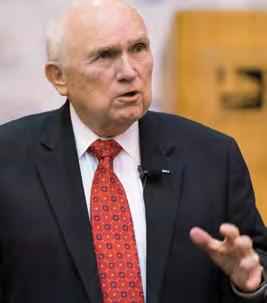
1 minute read
Focusing on Service-Learning
Coastal Georgia Students Make a Positive Impact
The Center for Service-Learning at the College was created in 2010 as a way to connect students, faculty, and the College community to the community at large. The intent of service-learning projects is to collaborate with local agencies to identify community needs in Glynn and surrounding counties and address those needs through student-led projects. These projects are designed to reinforce classroom instruction while providing meaningful service to the community. Students gain a deeper understanding of course content, develop skills in community leadership, and advance their appreciation of social responsibility, global awareness, and diversity. The service-learning program has worked closely with more than 50 community partners including America’s Second Harvest of Coastal Georgia, Coastal Georgia Area Community Action Authority, Inc., Georgia Sea Turtle Center, Glynn County School System, Southeast Georgia Health System, St. Marys Children’s Theatre, and United Way of Coastal Georgia, Inc.
Advertisement
Service-learning projects are diverse in nature and include such things as nursing students providing free health screenings for the homeless; geology students holding hands-on science activities for “Rocking STEM Day” for the Marshes of Glynn Libraries’ Reading Rocks summer program; and culinary students participating in a cook-off to benefit America’s Second Harvest Food Bank by creating dishes using ingredients available at the food pantry.
These projects are made possible through mini-grants funded by the Foundation. “The grants provide resources for our students to purchase supplies during their service-learning projects. A small amount of money can facilitate a large reach into the community,” said Dr. Kimberly Mannahan, director of Service-Learning and Undergraduate Research and associate professor of psychology. “We continue to be impressed with how service-learning allows students to creatively apply what they’ve learned in the classroom out in our community. These projects are enhancing student learning while contributing to the wellbeing of the region.”








